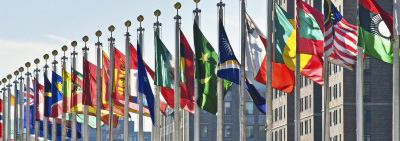Do I Have To Register A Copyright By Country?

The United States is a party to the Berne Convention, an international copyright marriage adopted past 165 countries. Under the Berne Convention, all party countries must recognize the copyright of works of authors from every other Berne Convention country. Under the Berne Convention copyright is automatic and does not require formal registration.
In addition, in the United States, works starting time published exterior the United States do non need to be registered prior to filing a copyright infringement claim. In this mode, foreign works are provided greater protection than U.S. works, which must be registered in lodge to obtain a judgment under the Copyright Deed.
With automated protection of works from 165 countries (including all industrial, developed countries with the notable exception of Taiwan) and the ability to bring a lawsuit in U.Southward. Courts, what is the indicate of obtaining a U.S. Registration for a foreign work?
The brusque reply? You get a bigger hammer.
Specifically, registration of whatever copyrighted work in the U.S. prior to infringement occurring allows the copyright holder to seek statutory damages and attorney's fees.
Why is this important? 2 reasons. Commencement, it's always nice to have an opportunity to contend that some or all of your attorney'south fees should be paid by someone else. Second, information technology is oftentimes extremely hard to show actually damages in a copyright case. Take for example a photograph published on a website. If another website uses the same photo what are the actual amercement to the copyright owner? Statutory amercement let the courtroom to set the amercement based on the facts of the instance (due east.grand. purpose of infringing use, intent, etc.) rather than the actual damages (perhaps none) incurred by the copyright owner. Statutory damages range from $750 to $30,000 per infringement and can go as high equally $150,000 if the court finds that the infringement was "willful."
The Trouble with the Net
In addition to it simply beingness a "expert idea" to register a foreign work in the The states, the cyberspace has made the question of where a work is fist published more difficult to determine. In several District Court cases, the question has arisen as to whether a work first published on a strange website was actually simultaneously published world-wide. If the work was first published both in the United States and another country, under U.S. copyright police, the work is considered a U.S. work requiring registration prior to litigation.
Bottom line: If yous want to make certain you have the ability to file a lawsuit in the U.S. with the biggest hammer possible, y'all must register your piece of work with the U.S. Copyright Office.
Do I Have To Register A Copyright By Country?,
Source: https://borgheselegal.com/news/39-copyright/91-do-you-need-to-file-copyright-registration-in-the-united-states-for-a-foreign-work
Posted by: shoffneranxionce.blogspot.com


0 Response to "Do I Have To Register A Copyright By Country?"
Post a Comment